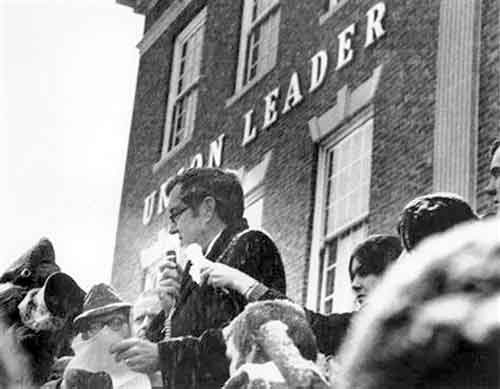Federal Bureau of Investigation records released Friday show that three times in early 1972 federal investigators probed threats to kill U.S. Sen. Edmund Muskie of Maine, at the time a leading contender within the Democratic Party for president.
It doesn’t appear from the 1,038 pages of material released to the Sun Journal that the FBI ever tracked down two of the culprits. Federal prosecutors opted not to charge the other, a mentally ill man quickly found by agents.
The information, sought via a Freedom of Information request for anything in FBI files related to Muskie, contained little about the former senator himself. Muskie was a former Maine governor, Democratic vice presidential candidate in 1968 and U.S. secretary of state during the final year of President Jimmy Carter’s administration.
One memorandum shows that Carter notified the FBI on April 30, 1980, that he intended to nominate Muskie to replace his current secretary of state, Cyrus Vance. Field offices were told to expedite efforts to probe the Rumford, Maine, native’s background.
Agents quickly fanned out to talk with friends and family members and look at Muskie’s military records from World War II, among other things.
The memo to agents said that Muskie “will be required to make decisions concerning policy and personnel matters; therefore, during interviews, determine if appointee has expressed or manifested any bias or prejudice against any class of citizen, or any religious, racial or ethnic group. Also determine if appointee uses illegal drugs or abuses alcohol.”
Only one negative thing turned up, records show: On Dec. 28, 1965, in the tiny town of Centreville on Maryland’s Eastern Shore, Muskie was issued a criminal summons at Broadwater Farms for “attempting to take migratory water fowl with the aid of bait.”
Muskie paid the $25 fine and $2.50 administrative charge before having a guilty verdict entered on the charge in 1966. It was the only charge against Muskie that investigators unearthed and it didn’t have any impact on his appointment.
Muskie was confirmed for the diplomatic post by a vote of 96-2 in the U.S. Senate on May 8, 1980.
Muskie had long been in the public eye by then, especially from the time he ran unsuccessfully for vice president in 1968 through his failed presidential bid in 1972, a period when he pushed through both the Clean Air Act and the Clean Water Act.
That national attention no doubt played a role in the decision by an unknown letter writer in Bryantown, Maryland, to include him among four prominent Democrats who would allegedly be blown to bits in their Capitol Hill offices on May 4, 1972.
Bomb threats were taken seriously even in those less security-conscious days. A major blast in 1971 in the Capitol had caused serious damage, though no injuries.
Handwritten letters were dropped into a post office box addressed to Muskie and fellow U.S. Sens. George McGovern of South Dakota and Ted Kennedy of Massachusetts. The notes to each said they were due to die along with U.S. House Speaker Carl Albert.
The letter to Muskie, opened the morning of May 4 in his office, told him the men would be killed “in your own offices.”
“The bomb is supposed to be dynamite, with a contact fuse,” the writer claimed in the note to Muskie. “It is pre-planned & the bomb is to be placed under chairs.”
“We hope this is not going to happen, but we really hope you will check,” the letter said, claiming it had been dictated by the Ouija Board.
The FBI managed to pull a couple of fingerprints off the envelope but could not match them with anyone. There is no indication in the file that agents ever found who sent the letters, who may have also sent threatening notes months earlier to Kennedy, President Richard Nixon, The New York Times and The Boston Globe.
In January 1972, letters signed by a G.C. Carlton in Bryn Mawr, Pennsylvania, told Muskie, Kennedy and U.S. Sen. Edward Brooks of Massachusetts they should be shot.
In the note to Muskie, the writer said, after offering an uncharitable view of the senator’s wife, that the lawmaker “should be deported to Poland or Rome.”
“Somebody should fill you and the bastard harp Kennedy full of lead,” the letter read before it turned even more profane, ending with the insistence that both Kennedy and Muskie should “rot in hell.”
The FBI managed to find a few aliases from the same writer — his language was a dead giveaway — but appears to have had no success in determining his real identity.
The investigation ceased after an assistant U.S. attorney in Philadelphia ruled on Feb. 24, 1972, that the letter to Muskie “does not constitute a threat within the meaning and intent” of the relevant federal statute.
That same month, a caller who phoned a number of media outlets, including United Press International in the wee hours of the morning, claimed both Muskie and Alabama Gov. George Wallace had been targeted by something called the Black Underground Military for Justice, a group that authorities knew nothing about.
Agents soon tracked him down, discovering he was someone they’d spoken with before who had a mental illness and had provided useless information in other incidents. In person, he admitted he made it all up so the matter was dropped.
Muskie died in 1996 at the age of 81.
Comments are not available on this story.
Send questions/comments to the editors.



